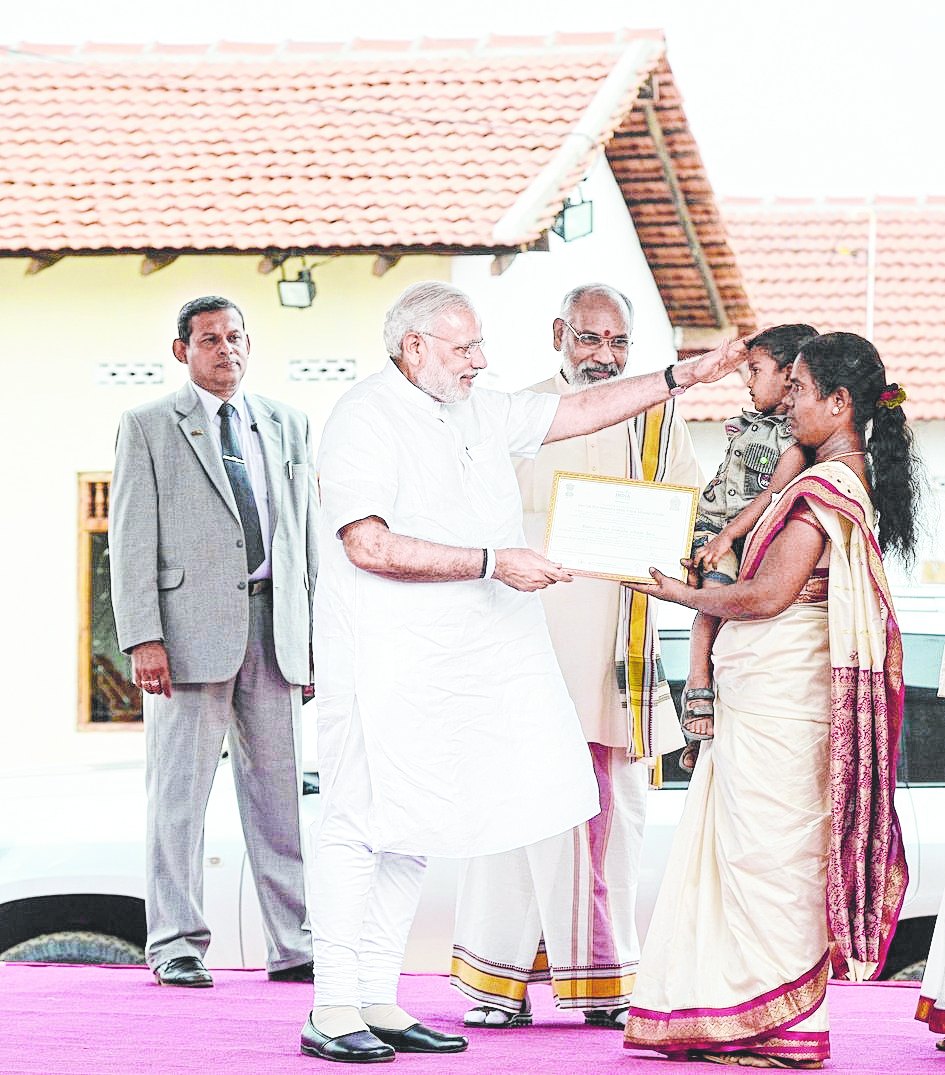
Prime Minister Narendra Modi interacts with Tamilians in Jaffna on Saturday at a ceremony to hand over Indian-funded houses to them. (AFP)
New Delhi, March 14: A symbolic visit to Sri Lanka's north today forced Prime Minister Narendra Modi to confront a deep political divide that has resurfaced between Jaffna and Colombo two months after rare unity dethroned former President Mahinda Rajapaksa and spawned hopes of a post-civil war settlement.
Modi became the first Indian Prime Minister to visit Jaffna, landing in the afternoon after first visiting Anuradhapura, a city in central Sri Lanka sacred to the country's Buddhist majority, and then flagging off a train in the north-west that will run on India-built tracks.
But Modi's first public event in Jaffna, the laying of a foundation stone for an Indian cultural centre there, exploded into a platform for the Tamil chief minister of the Northern Province to lay bare the tensions that India had hoped to bridge with the new government in Colombo.
C.V. Wigneswaran, the chief minister of the Tamil-dominated province, dubbed the India-Sri Lanka peace accord of 1987 inadequate to guarantee rights of Lankan Tamils. He demanded fresh trilateral talks, including both nations and the provincial councils of the northern and eastern provinces where most Tamils in Sri Lanka reside.
'The 13th amendment can never be the final solution,' Wigneswaran said, referring to the amendment to the Lankan Constitution introduced as a by-product of the 1987 accord inked between then Prime Minister Rajiv Gandhi and Sri Lankan President J.R. Jayawardene.
'May I suggest that there be talks between the Sri Lankan government, Indian government, NPC and the EPC.'
Any talk of trilateral talks in determining the fate of Lankan Tamils is anathema to Colombo, which was represented by foreign minister Mangala Samaraweera at the event where Wigneswaran spoke.
'We need you as a guarantor of our rights,' the chief minister said, addressing Modi.
Wigneswaran is not the first Lankan Tamil leader to articulate concerns about the potential of the 1987 pact and the 13th amendment to resolve the community's concerns - but his public articulation in front of Modi and Samaraweera was unexpected, a senior Indian official said.
'It was embarrassing,' the official said. 'But it was also a pointer to just how deep the divisions between Colombo and Jaffna are, yet again.'
Wigneswaran led a resolution in the Northern Provincial Council (NPC) last month criticising the new Lankan government of President Maithripala Sirisena. That resolution has reopened old wounds that appeared to be healing when the Tamil National Alliance - to which Wigneswaran belongs - campaigned and fought the January presidential elections alongside Sirisena.
The chief minister lavishly praised Modi for his work in Gujarat and his model of devolution of powers to states.
'As Prime Minister, you have dismantled the centralised planning system,' Wigneswaran said. 'You are an advocate for devolution. That is what we are arguing for in Sri Lanka.'
Modi responded minutes later by referring to the praise and his support for the full implementation of the 13th amendment but did not delve into the arguments made by Wigneswaran.

